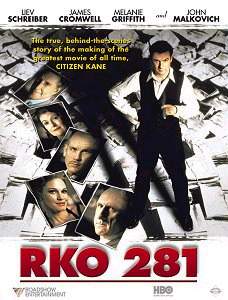Plot
In 1940, Orson Welles, RKO studio head George J. Schaefer, and screenwriter Herman J. Mankiewicz struggle in making what will be considered the greatest American film, Citizen Kane . Welles and Mankiewicz attend a party at Hearst Castle where meeting the hypocritical and tyrannical William Randolph Hearst gives Welles the inspiration to make a film about Hearst's life. Mankiewicz is against it because he knows Hearst's wrath will be horrible, but Welles says this is the film. Mankiewicz finally agrees.
At first, Welles tries to take credit for everything, including the script, and Mankiewicz is furious with Welles—he faces him, and Welles says he has every right and cuts ties with Mankiewicz. Orson later reconsiders and asks Mankiewicz to continue re-drafting the screenplay, giving him a joint credit. After learning from the gossip columnist Hedda Hopper, who had viewed a press screening, that Welles' film is actually a thinly veiled and exceptionally unflattering biography of him, publishing tycoon Hearst uses his immense power and influence to try to prevent the release of the picture. Hearst's mistress, actress Marion Davies, endures the embarrassment of having their private lives exposed and vilified. Hopper threatens to do the same to the studio executives of Hollywood if they release the film. Marion gives Hearst money when his finances begin to diminish (by selling all the jewelry he gave her and giving him the money in the form of a check).
In the end, after considerable delays and harassment, plus the disintegration of the professional relationship between Welles and Mankiewicz and a costly blow to Schaefer's career, the film is finally released. Its publicity is muted by Hearst's ban on its mention in all his publications and its commercial success is limited. Welles ultimately has the satisfaction of having created one of the most critically acclaimed films of all time.
This page is based on this
Wikipedia article Text is available under the
CC BY-SA 4.0 license; additional terms may apply.
Images, videos and audio are available under their respective licenses.
